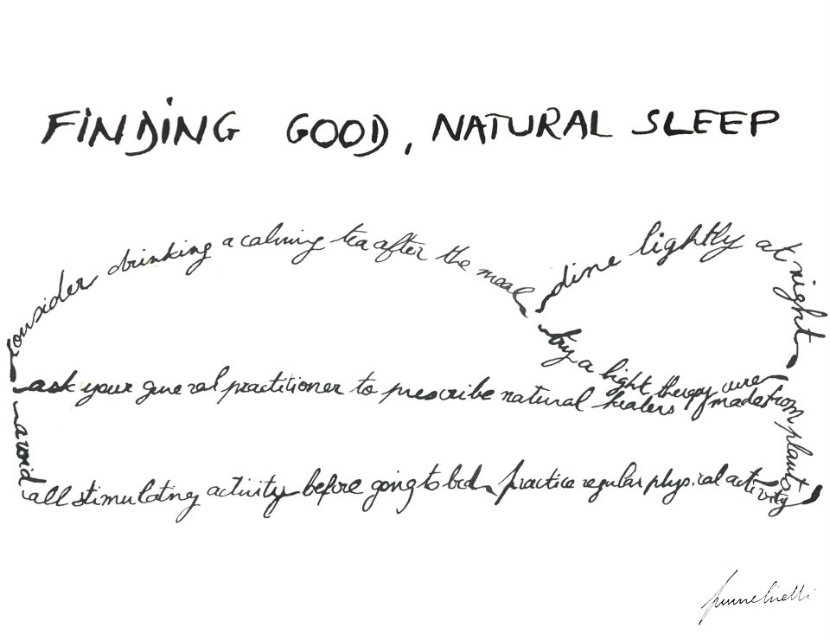Finding Good, Natural Sleep
Being able to achieve a good, reparative sleep has been essential since the beginning of humanity, as fatigue wanes our immune resistances and can lead to depression.
Being able to achieve a good, reparative sleep has been essential since the beginning of humanity, as fatigue wanes our immune resistances and can lead to depression.
To help achieve a good restorative rest try these natural recipes and dietary tips.
– Dine lightly at night, by avoiding sugar and greasy foods. Instead, prepare a small lettuce salad with either baked or steamed potatoes, pasta, rice, small amounts of grains and cereals (be wary of eating in excess of anything at night, as it can lead to gained weight), and steamed green vegetables.
– Consider drinking a calming tea after the meal: a lemon balm tea (antispasmodic and good for digestion and heart health), chamomile (calming and repairs tissues), lavender (soothing and good for vascular draining), passionflower (calming), and poppy flower tea (calming, good for lymph draining).
– You can also ask your general practitioner to prescribe natural healers made from plants such as griffonia simplicifolia (a plant rich in L-5 hydroxytryptophan), saffron (which has the property of regulating mood), prairie crocus flower (which regulates spasmodic, anxious and neurotic states), and also the use of homeopathic stones such as lepidolite and tourmaline which you will use in D8 (the 8th decimal is the one mostly used in homeopathic dilution).
– Try a light therapy cure: This consists of using the benefits of light to boost good mood thanks to specific light therapy instruments that allow one to easily organize reinvigorating light therapy cures at home.
– Diet plays a complementary role to light therapy
An amino acid called tryptophan!
These are amino acids brought by diet, precursors to seratonin. Even if their presence alone is not enough to produce seratonin, to not eat any can aggravate a seratonin defecit.
With this, it helps to add foods that contain omega-3, vitamin B, and magnesium.
Here is a non-exhaustive list of foods rich in tryptophans:
• poultry, turkey in particular
• eggs
• meat
• fatty fish (wild salmon, mackerel, sardine, herring, eel, anchovies, halibut…)
• Soy
• tomatoes,
• eggplant,
• avocado,
• bananas
• nuts, in particular cashews, but also almonds and peanuts,
• cocoa,
• grains, in particular whole grains, pumpkin seeds
• yeast extract
It takes your body 20 minutes to fabricate the natural sedatives that allow for restful sleep.
– Avoid all stimulating activity before going to bed (computer screens, television, stressing thoughts…)
In fact, it takes your body 20 minutes to fabricate the natural sedatives that allow for restful sleep.
Respect this time and if your eyes become heavy and itchy it is too late to get up and brush your teeth! You risk wasting these naturally synthesized sedatives, and if you are already in deficit you will have to wait until the sandman’s next rounds…
– If you find yourself wide-awake in the middle of the night, avoid plunging into captivating reading or worse, working on your job or accounts. This creates a habit which could lead to persistent troubled sleep.
The wisest course of action is to remain in bed and relax. Even if you do not fall back asleep you will feel less tired in the morning.
– Practice regular physical activity (For those who dislike sports or working out, a daily 35-40 minute walk at a regular pace is a good habit to form) it allows you to oxygenate your system and helps for restful sleep. Read the article from our contributor Katherine Greiner on this subject (HERE).
DID YOU KNOW?
Passiflora is an anxiolytic that facilitates the liberation of endorphins and thus procures a sensation of well-being and relaxation.
Passiflora and valerian are the key plants for sleep
The Aztecs already knew the effects of this plant on the nervous system.
It is a veritable treasure for calming anxiety, acting on spasms and facilitating sleep.
Passiflora is an anxiolytic that facilitates the liberation of endorphins and thus procures a sensation of well-being and relaxation.
As for anecdotes, there are multiple legends about the Passiflora, the plant which gives us the passion fruit.
One tells of Christopher Columbus, arriving in the New World, thanking God for having arrived safely on this unknown land. In searching this newfound country, he set his sights upon an until now unknown plant. Wearing one on the head gives the impression of the crown of thorns worn by Jesus, and he decided thus to name it “the passion of the Christ incarnate”, or in its Latin name “Passiflora incarnata”.
If we associate this plant with Valerian (Valeriana officinalis) sleep can be very profound, as passiflora amplifies the sedative and hypnotic effects of Valerian.
The overall lowering of luminosity automatically makes our body transform seratonin into melatonin. If we pursue activities late at night instead of going to bed, we exhaust our melatonin.
Our mood depends also on our sleep.
Good mood depends upon a neurotransmitter called seratonin, the neurotransmitter favoring sleep.
Since the invention of electricity, our nights have become much longer and much more active, but this evolution disturbs the proper functioning of our neurotransmitters and can cause depression or trouble sleeping, the two are intertwined. In fact, the interior lighting of our houses has a weaker luminosity than that of the sun. The overall lowering of luminosity automatically makes our body transform seratonin into melatonin. If we pursue activities late at night instead of going to bed, we exhaust our melatonin. This is a vicious cycle since, by interaction, we are also exhausting our seratonin which doesn’t stop turning into melatonin.
All of this could lead to depression (due to the lowered levels of seratonin) and trouble with sleep (due to exhausting the melatonin that is no longer being used to progressively enter the sleep cycle)!
The same is true in the morning: the alarm sounds while it is still nighttime outside. The body is confused, its logical functioning order is disturbed, the eyes are opened while the body is flooded with melatonin, seratonin not having yet pulled itself together due to the luminosity being too weak.
Marie-Laure de Clermont-Tonnerre is a journalist and author.
«La médecine personnalisée, retrouver et garder la santé» (Odile Jacob) was published in March 2012 after two years of investigation and research with general practitioner Dr. Jean-Claude Lapraz.
«Se soigner toute l’année au Naturel» (Prat) was published in 2012 and has sold over 250 000 copies. Her latest book «Etre en Bonne santé toute l’année : 20 cures alimentaires» was launched in April 2015.






